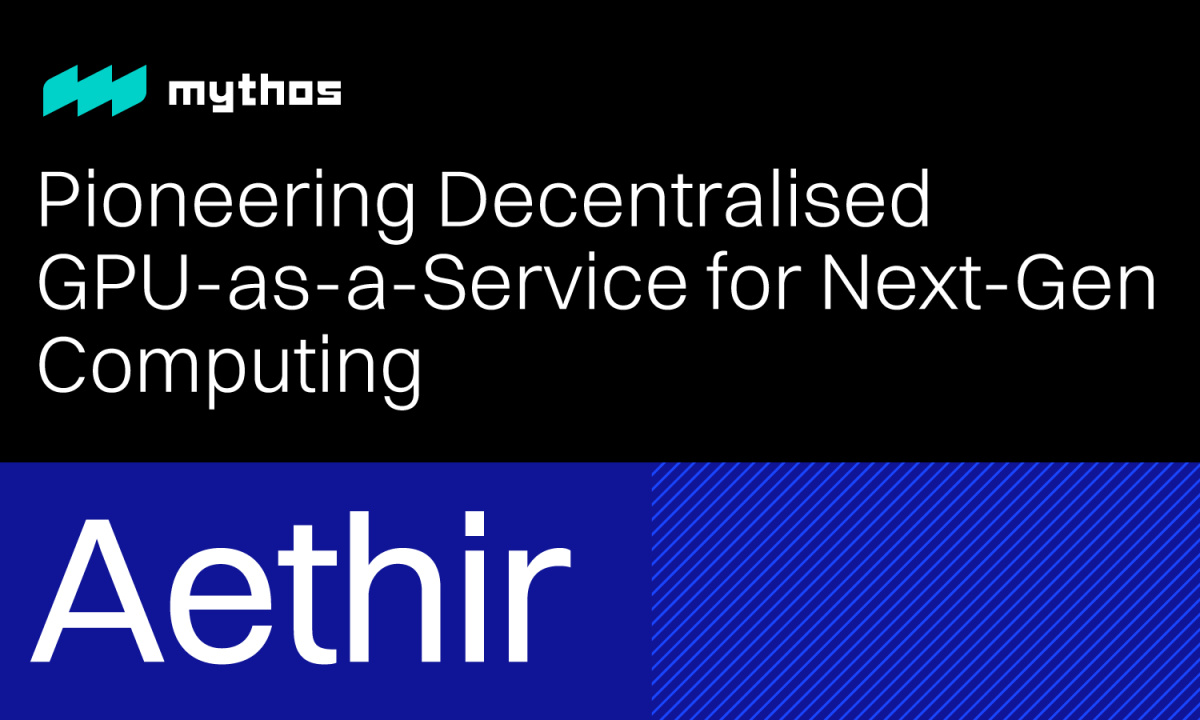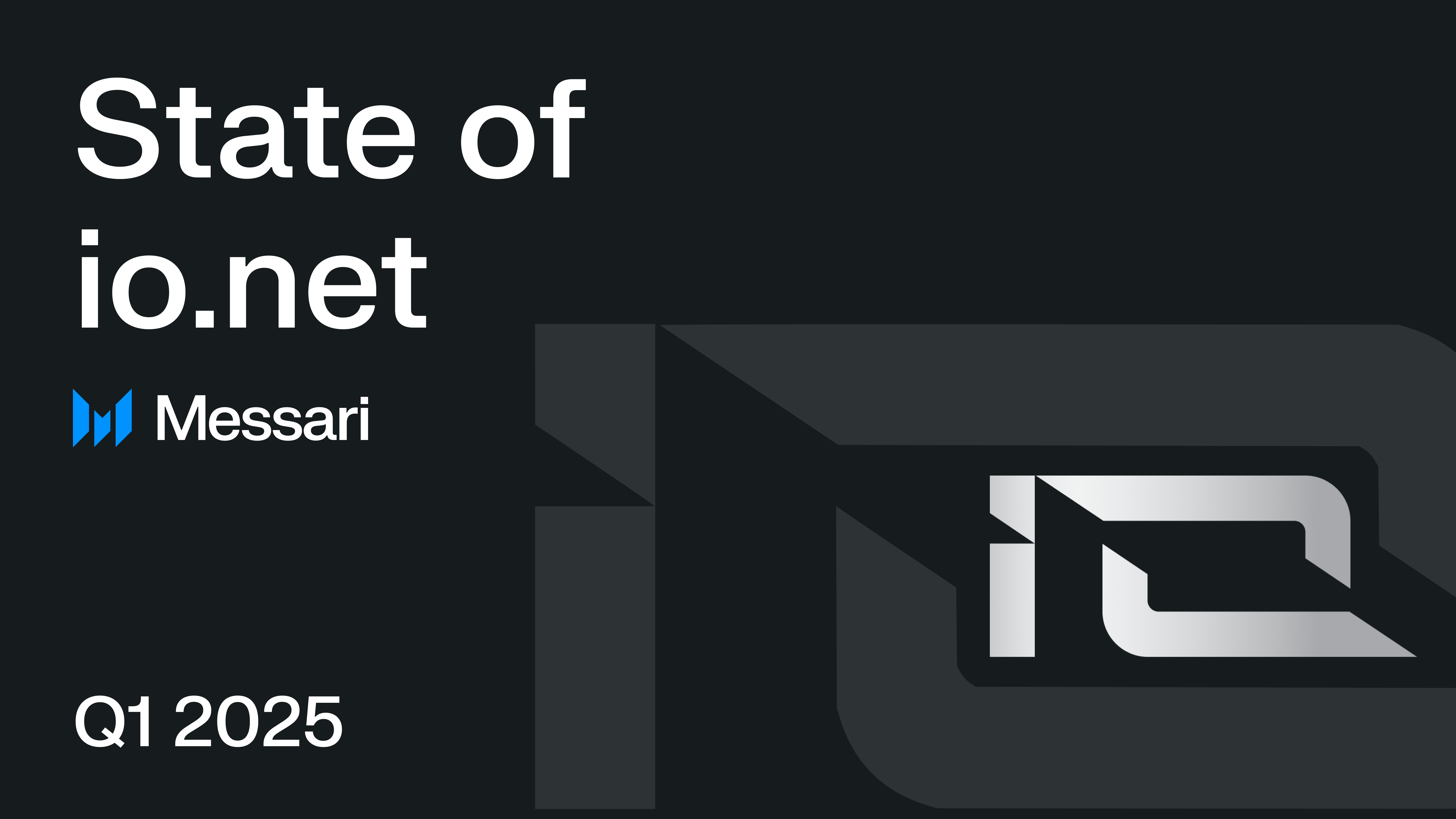In-Depth Analysis of Aethir's Decentralized GPU-as-a-Service Platform
Thursday, June 6, 2024 11:36 AM
450

Aethir, a decentralized GPU-as-a-Service platform, has been analyzed in a new report by Mythos Research and CMC Research. The report delves into Aethir’s technology, partnerships, and market position in Decentralized Physical Infrastructure Networks (DePIN). Aethir aims to connect GPU providers with consumers in AI, gaming, and virtual computing. It boasts a $24 million GPU infrastructure across 13 countries, serving as a marketplace for aggregated GPU resources. The platform’s diverse network allows for efficient pooling and utilization of distributed computing resources, highlighting its potential in the decentralized infrastructure market.
Buy Now at
Related News

6 days ago
Sungkyunkwan University’s AIM Lab Adopts Theta EdgeCloud for AI Research AdvancementSungkyunkwan University’s AI & Media Lab (AIM Lab), led by Professor Sungeun Hong, has become the 32nd academic institution globally to adopt Theta EdgeCloud, a decentralized GPU infrastructure tailored for AI and machine learning research. This partnership will significantly enhance the AIM Lab's capabilities in areas such as multimodal learning, domain adaptation, and 3D vision. Notably, their recent work, supported by Samsung, titled "Question-Aware Gaussian Experts for Audio-Visual Question Answering," has been accepted as a Highlight Paper at CVPR 2025, one of the most prestigious AI conferences. The integration of Theta EdgeCloud will allow researchers to access high-performance GPU resources on demand, facilitating faster iterations while reducing costs.
Professor Hong, an expert in multimodal AI and robotic perception, emphasizes the advantages of Theta EdgeCloud in providing the necessary computing flexibility to advance their research. The AIM Lab's focus on vision-language modeling and privacy-preserving domain transfer will benefit from the decentralized architecture, enabling rapid training and evaluation of models. The collaboration with Samsung further strengthens the lab's research output, showcasing a strategic relationship that enhances the development of impactful AI technologies.
The AIM Lab's recent achievements, including the innovative QA-TIGER model for video question answering and a memory-efficient attention mechanism for image segmentation, highlight the lab's commitment to cutting-edge research. By joining a network of esteemed institutions leveraging Theta EdgeCloud, such as Stanford and KAIST, Sungkyunkwan University is poised to lead in the advancement of AI innovation. This partnership not only accelerates research but also positions the AIM Lab at the forefront of developing socially relevant AI applications, demonstrating the power of academic-corporate collaboration in the tech landscape.

10 days ago
io.net Reports Revenue Growth Amid Market ChallengesIn the latest quarterly report, io.net has demonstrated significant growth in revenue, achieving an impressive 82.6% increase, which brought its total revenue to $5.7 million. This surge in revenue is particularly noteworthy given the broader contraction in the cryptocurrency market, where the market cap of its IO token plummeted by 71.4% to $108 million, alongside a 74.9% drop in token price. Despite these challenges, io.net has successfully integrated with various AI and compute-focused platforms, including partnerships with Zerebro, KREA, and Injective, aimed at enhancing decentralized GPU compute capabilities for applications in AI and DeFi.
The infrastructure of io.net, which is built on a decentralized network of GPUs and CPUs, allows for scalable access to compute resources, particularly for machine learning and AI applications. The platform supports a wide array of machine learning frameworks, ensuring flexibility and efficiency in resource allocation. However, the average daily verified compute resources have seen a decline, with verified GPUs and CPUs down 11.1% and 4.5% respectively. This reduction reflects ongoing supply-side challenges and a decrease in token incentives, which has impacted the overall activity within the network.
Despite the mixed performance metrics, io.net has maintained a steady pace of development, with numerous collaborations aimed at expanding its ecosystem. The partnerships formed in Q1 2025, including those with Alpha Network and Mira Network, highlight io.net's commitment to enhancing decentralized AI infrastructure. As the project continues to refine its economic models and expand its network capabilities, it remains a key player in the evolving landscape of decentralized compute resources, even amid a challenging market environment.

10 days ago
Ben Goertzel: Pioneering Decentralized AI for a Better FutureBen Goertzel, a pioneer in artificial intelligence, has been advocating for decentralized AI since he wrote his first line of code 30 years ago. As the world stands on the brink of achieving Artificial General Intelligence (AGI), Goertzel emphasizes the importance of decentralization in ensuring that this powerful technology benefits humanity rather than serving centralized powers. At the recent Consensus conference in Toronto, he expressed optimism that AGI could be launched within the next one to three years through his project, SingularityNET, which aims to create a global marketplace for AI services. The project has made significant strides, including partnerships with Mind Network and Filecoin Foundation, a $53 million investment in a modular supercomputer, and a token merger with Ocean Protocol and Fetch.ai.
Goertzel's vision for decentralized AI is rooted in his early experiences with the internet, which he initially saw as a decentralized platform. However, he notes that the rise of tech giants like Google and Facebook has led to a more centralized internet, which undermines the foundational principles of decentralization. He argues that for AGI to be a force for good, it must be built on decentralized architecture from the outset. This philosophy is reflected in the design of SingularityNET, Hyperon, and the upcoming ASI Chain, which is tailored for decentralized AI applications. Goertzel believes that the trajectory of the post-AGI era will significantly differ based on the role of decentralized ecosystems in its development.
In addition to his work in AI, Goertzel has a history of exploring decentralized money concepts dating back to the 90s. Although he and his peers initially dismissed the practicality of decentralized transactions due to concerns over speed and cost, the emergence of Bitcoin has validated some of his early ideas. He humorously reflects on the missed opportunities of that era, acknowledging that their lack of business acumen prevented them from envisioning the darker applications of decentralized money. Today, Goertzel's commitment to decentralized AI continues to gain traction, positioning him and his initiatives as key players in the evolving landscape of technology and governance.

10 days ago
CUDOS Intercloud April Update: Record Growth and New InitiativesIn April, CUDOS Intercloud celebrated significant milestones and shared impressive metrics in its monthly update. The platform reported a record revenue of $204,505, alongside a remarkable 27% increase in GPU consumption, totaling over 300,000 hours. This growth reflects the rising demand for decentralized computing solutions, with more than 2 million GPU compute hours surpassed. CUDOS emphasized its commitment to transparency by providing real-time metrics on GPU capacity, VM deployment, user growth, and ecosystem spending, showcasing a clear distinction in cloud service delivery.
A notable highlight was the six-month anniversary of CUDOS's partnership with the Artificial Superintelligence Alliance (ASI). During this period, CUDOS has served over 15 million GPU hours and welcomed more than 30,000 users. The collaboration aims to build a decentralized compute layer that supports AI development without centralized bottlenecks. Additionally, CUDOS introduced "One Click Computing," allowing users to deploy AI stacks effortlessly, eliminating the complexities traditionally associated with AI deployment.
CUDOS also participated in the Ai2Peace initiative, focusing on using AI for global good. The platform's community rewards program concluded at the end of April, encouraging user engagement through referrals and feedback. Furthermore, CUDOS was represented at Paris Blockchain Week, where discussions highlighted the importance of permissionless compute access and the potential for blockchain to enhance AI's energy efficiency. As CUDOS continues to innovate and expand its offerings, it aims to foster a more sustainable and accessible computing environment for all users.

14 days ago
Investors Eye GRASS and PI Crypto Tokens Amid Market LiquidationsInvestors are currently focused on the GRASS and PI crypto tokens, which are making headlines due to their unique value propositions. The ongoing presale of Best Wallet has also garnered attention, raising over $12 million. In the past 24 hours, perpetual crypto exchanges like Binance, Bybit, and OKX have liquidated over $665 million in leveraged positions, affecting more than 153,000 traders. Despite this turmoil, many traders remain optimistic about GRASS and PI, viewing them as potential breakout tokens for Q2 2025. Notably, PI crypto has surged 80% since early April, while GRASS has increased by 140% since its all-time low in late October 2024.
GRASS is a decentralized layer-2 platform built on Solana, supported by prominent venture capitalists such as Polychain Capital and Tribe Capital. It allows users to monetize idle internet bandwidth, which is crucial for AI model training. The platform has facilitated the scraping of an impressive 57 million GB of public web data in Q1 2025 alone. Participants earn GRASS points, convertible to GRASS tokens, and the platform has seen a significant increase in node operators, indicating growing interest and adoption. Analysts are ranking GRASS among the top cryptocurrencies to explore, highlighting its potential in the AI and decentralized physical infrastructure network (DePIN) sectors.
On the other hand, Pi Network is making strides toward decentralization, having recently disabled its central node, thus empowering its community of over 60 million users. Despite facing skepticism regarding its legitimacy, Pi Network's mainnet launched in February 2025, and the price of PI crypto has fluctuated significantly since then. As both GRASS and PI continue to evolve, investors are advised to conduct thorough research before making investment decisions. Furthermore, the Best Wallet presale is generating excitement, with its features and security measures positioning it as a strong competitor in the crypto wallet space.

17 days ago
IPFS Revolutionizes Data Transmission in Space with Filecoin and Lockheed MartinThe Interplanetary File System (IPFS) has made significant strides in reducing latency for data transmissions in space, as demonstrated by a successful collaboration between the Filecoin Foundation and Lockheed Martin Space. During the Consensus 2025 conference in Toronto, Marta Belcher, president of the Filecoin Foundation, revealed that they have successfully transmitted data using a version of IPFS on a satellite orbiting Earth. This adaptation enhances privacy and security by identifying data based on its content rather than its location, which is particularly beneficial for space communications. The architecture of IPFS is designed to mitigate delays, address data corruption from radiation, and enable cryptographic verification to ensure data integrity.
Belcher highlighted the challenges of data transmission from celestial bodies, noting the multi-second delay from the Moon and multi-minute delay from Mars. The IPFS system allows users to retrieve data based on a content ID from the nearest source, whether it be a personal device, a nearby satellite, or a lunar station. This decentralized approach reduces reliance on centralized data centers and improves the reliability of data storage in environments where hardware may degrade, which is crucial for maintaining the integrity of sensitive materials like satellite images.
The growing interest in decentralized archival storage among media companies and potential military applications of this technology indicate a promising future for IPFS. Belcher emphasized the power of having a deep archive accessible globally, which could revolutionize how media and military organizations manage their data. Additionally, the FIL token, a utility token within the Filecoin ecosystem, boasts a market capitalization of approximately $1.8 billion, reflecting the increasing relevance of decentralized storage solutions in today's digital landscape.
Signup for latest DePIN news and updates